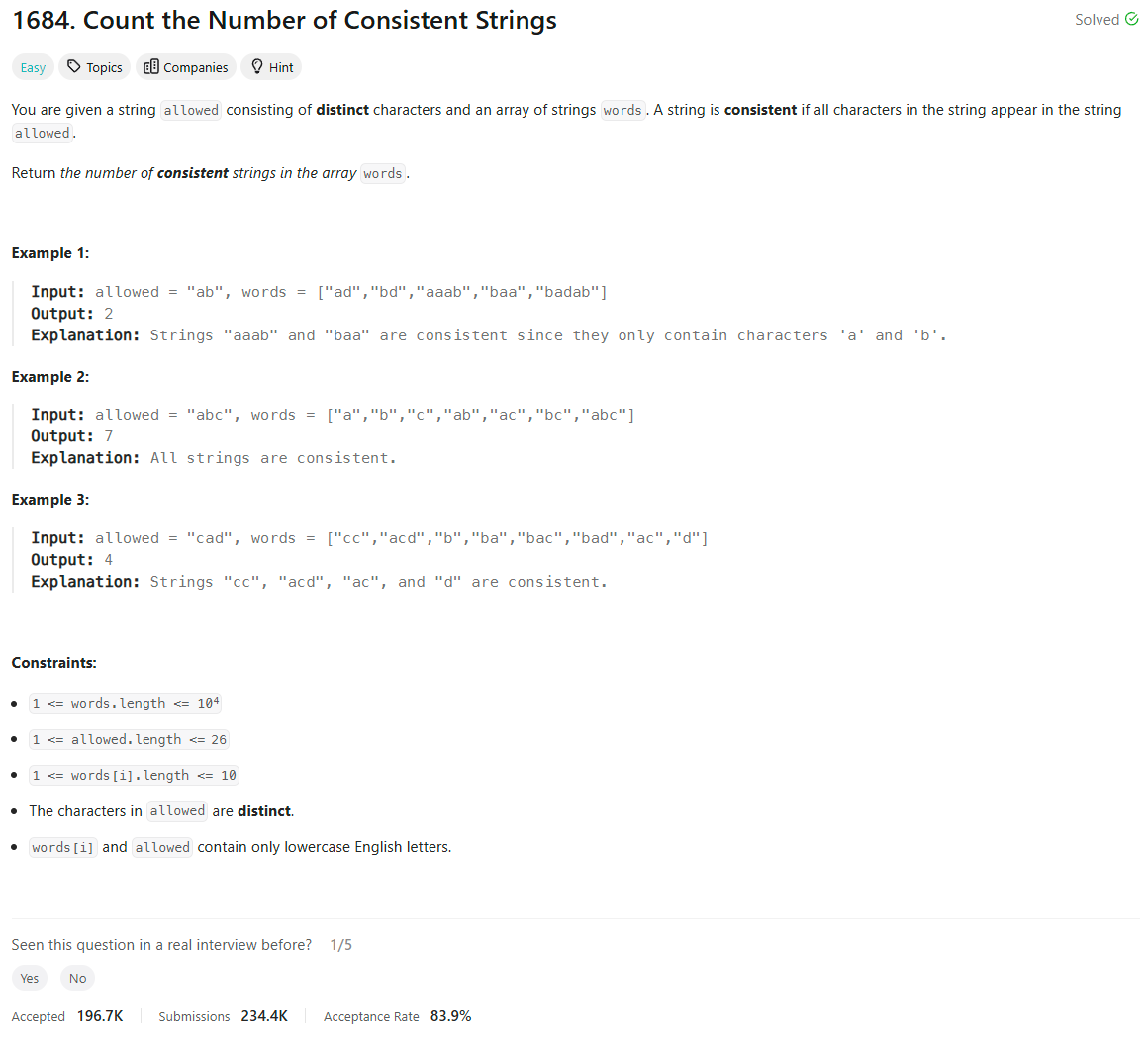Problem of The Day: Count the Number of Consistent Strings
Problem Statement

Intuition
The problem is asking to count how many strings in the words list consist only of characters present in the allowed string. The first thought is to use a set to check if each word contains only valid characters, since set lookup is efficient and the problem doesn’t require ordering or duplicates.
Approach
- Convert the
allowedstring into a setallowed_set, which allows for O(1) lookups. - Initialize a counter
resto count how many words meet the criteria. - Iterate over each word in the
wordslist:- Convert the word to a set to remove duplicate characters.
- For each character in the word, check if it exists in
allowed_set. - If a word contains any character not in the
allowed_set, break the loop. - If all characters in the word are valid, increment the
rescounter.
- Return the count
resafter checking all words.
Complexity
-
Time complexity:
The time complexity is \(O(n \cdot m)\), where \(n\) is the number of words in the
wordslist and \(m\) is the average length of each word. This is because for each word, we need to check each of its characters against theallowed_set. -
Space complexity: The space complexity is \(O(1)\) for the counter and temporary variables, but \(O(k)\) for the
allowed_setand \(O(m)\) for each word set, where \(k\) is the number of unique characters inallowedand \(m\) is the size of the word.
Code
class Solution:
def countConsistentStrings(self, allowed: str, words: List[str]) -> int:
res = 0
allowed_set = set(allowed)
for word in words:
word_set = set(word)
for c in word_set:
if c not in allowed_set:
break
else:
res += 1
return res
Editorial
Approach 1: Brute Force
class Solution:
def countConsistentStrings(self, allowed: str, words: List[str]) -> int:
consistent_count = 0
# Iterate through each word in the words list
for word in words:
is_word_consistent = True
# Check each character in the current word
for char in word:
is_char_allowed = False
# Check if the current character is in the allowed string
for allowed_char in allowed:
if allowed_char == char:
is_char_allowed = True
break # Character found, no need to continue searching
# If the character is not allowed, mark the word as inconsistent
if not is_char_allowed:
is_word_consistent = False
break # No need to check remaining characters
# If the word is consistent, increment the count
if is_word_consistent:
consistent_count += 1
return consistent_count
- time: O(m * n * k)
- space: O(1)
Approach 2: Boolean Array
class Solution:
def countConsistentStrings(self, allowed: str, words: List[str]) -> int:
# Create a boolean list to mark which characters are allowed
is_allowed = [False] * 26
# Mark all characters in 'allowed' as True in the is_allowed list
for char in allowed:
is_allowed[ord(char) - ord("a")] = True
consistent_count = 0
# Iterate through each word in the words list
for word in words:
is_consistent = True
# Check each character of the current word
for char in word:
# If any character is not allowed, mark as inconsistent and break
if not is_allowed[ord(char) - ord("a")]:
is_consistent = False
break
# If the word is consistent, increment the count
if is_consistent:
consistent_count += 1
return consistent_count
- time: O(m + n * k)
- space: O(1)
Approach 3: Hash Set
class Solution:
def countConsistentStrings(self, allowed: str, words: List[str]) -> int:
# Create a set to store the allowed characters
allowed_chars = set(allowed)
consistent_count = 0
# Iterate through each word in the 'words' list
for word in words:
# Check if all characters in the word are in allowed_chars
if all(char in allowed_chars for char in word):
consistent_count += 1
# Return the total count of consistent strings
return consistent_count
- time: O(m + n * k)
- space: O(m)
Approach 4: Bit Manipulation
class Solution:
def countConsistentStrings(self, allowed: str, words: List[str]) -> int:
# Create a bitmask representing the allowed characters
allowed_bits = 0
# Set the corresponding bit for each character in allowed
for char in allowed:
allowed_bits |= 1 << (ord(char) - ord("a"))
consistent_count = 0
# Iterate through each word in the words list
for word in words:
is_consistent = True
# Check each character in the word
for char in word:
# Calculate the bit position for the current character
bit = (allowed_bits >> (ord(char) - ord("a"))) & 1
# If the bit is 0, the character is not allowed
if not bit:
is_consistent = False
break
# If the word is consistent, increment the count
if is_consistent:
consistent_count += 1
return consistent_count
- time: O(m + n * k)
- space: O(1)